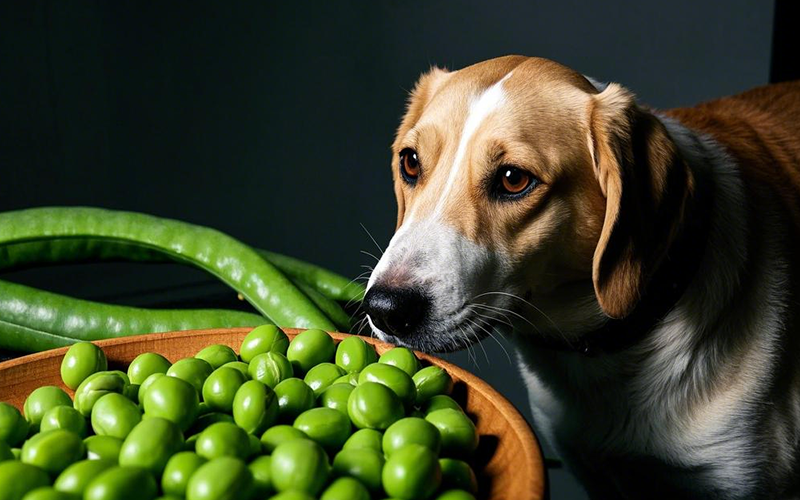Can Dogs Eat Green Peas?Here’s What You Need to Know!
- 19 Mar 2025 10:00
Yes, dogs can eat green peas, and they can actually be a nutritious and tasty treat when prepared correctly! Green peas are packed with essential vitamins, minerals, and fiber that offer numerous health benefits for your furry friend. However, there are a few things to keep in mind to ensure that peas are safe and beneficial for your dog.

🥗 Health Benefits of Green Peas for Dogs
Packed with Nutrients: Green peas are a great source of vitamin A, vitamin K, vitamin C, and several B vitamins. These nutrients help boost your dog’s immune system, support healthy skin, and contribute to good vision.
Rich in Fiber: The fiber in green peas helps with digestion and can promote a healthy gut. Fiber supports regular bowel movements and may help with constipation. It also helps your dog feel fuller for longer, which is great if you’re managing your dog’s weight.
Protein Boost: Green peas are a good source of plant-based protein, which supports your dog’s muscle health and overall energy.
Antioxidants: Peas contain antioxidants, such as vitamin C and flavonoids, that can help reduce inflammation and fight free radicals in your dog’s body.
🥒 How to Safely Feed Green Peas to Your Dog
Fresh or Frozen: Both fresh and frozen green peas are safe for dogs. Just make sure the peas are plain—without any added salt, seasonings, or sauces, as these can cause digestive upset.
Cooked vs. Raw: While dogs can eat raw green peas, it’s best to cook them lightly to make them easier to digest. Cooking them also eliminates any potential bacteria. Avoid adding any seasoning or oil when preparing them.
Moderation is Key: Green peas should be fed in moderation. Too many peas can lead to gas, bloating, or an upset stomach due to their fiber content. A small handful of peas (depending on your dog’s size) as an occasional treat should be plenty.
Pea Pods: While the peas themselves are safe, pea pods can be tough for dogs to digest. It’s best to remove the pods and only serve the inner peas.
🚫 Potential Risks of Green Peas for Dogs
Gas and Bloating: Due to their high fiber content, green peas can sometimes cause gas or bloating, especially in dogs that aren’t used to eating fiber-rich foods. If you’re introducing peas to your dog’s diet, start with a small amount and gradually increase the portion to avoid digestive issues.
Choking Hazard: For smaller dogs, large peas can pose a choking hazard, so make sure to serve them in small, bite-sized pieces.
Allergic Reactions: While rare, some dogs might have allergies to peas. If you notice any signs of an allergic reaction, such as vomiting, diarrhea, or itchiness, stop feeding peas and consult your pet assistant.
Excessive Consumption: While green peas are generally safe, feeding your dog too many peas can lead to an imbalanced diet due to their high fiber content. Peas should be seen as a treat, not a replacement for a balanced meal.
🦴 Healthy Alternatives and Snacks for Dogs
If you’re looking to vary your dog’s treats or want other healthy options, here are a few ideas:
Carrot Sticks: Low-calorie and great for teeth. 🥕
Blueberries: Full of antioxidants and vitamin C. 🫐
Sweet Potato: High in fiber and vitamins for a healthy gut. 🍠
Apple Slices: Full of vitamins, just remove the seeds. 🍏
Green Beans: Another healthy vegetable that many dogs love! 🥗
🤖 PettureX: Your Pet Health Assistant
If you’re ever unsure about what foods are safe for your dog or need personalized guidance, PettureX is here to help! PettureX is an AI-powered pet health assistant that provides 24/7 advice on nutrition, food safety, and pet health. It’s a great way to ensure your dog’s diet is balanced and healthy! 🐾💡
🏁 Conclusion: Can Dogs Eat Green Peas?
In conclusion, yes, dogs can eat green peas, and they offer several health benefits, including vitamins, fiber, and protein. Green peas are a healthy snack that can support your dog’s immune system, digestion, and muscle health. Just be sure to feed them in moderation, remove the pods, and serve them plain without any seasoning.
For more advice on your dog’s diet or to ensure they’re getting the best nutrition, PettureX is always ready to assist! 🐶💚
Related

Crunchy Curiosity: Can Dogs Safely Snack on Pork Rinds? A Deep Dive
- 21 Apr 2025
Pomegranate Seeds and Pooches: A Deep Dive into Whether Dogs Can Safely Indulge
- 21 Apr 2025
Can Dogs Eat Peaches? Vet Explains Benefits, Cyanide Risks & Safe Serving
- 16 Apr 2025
Can Dogs Eat Mulberries? Vet Explains Safety, Benefits & Potential Risks
- 16 Apr 2025
Can Dogs Eat Mozzarella? Vet Explains the Cheesy Truth (Risks & Benefits)
- 16 Apr 2025
Can Dogs Eat Maple Syrup? The Sugary Truth & Why Vets Advise Against It
- 16 Apr 2025
Can Dogs Eat Mango Skin? Vet Explains Why It's a Risky Chew!
- 16 Apr 2025
Can Dogs Eat Mac n Cheese? Vet Explains Why This Comfort Food Is Unsafe!
- 16 Apr 2025
Can Dogs Eat Liver? Vet Guide to This Nutrient-Dense Organ Meat (Benefits & Risks!)
- 16 Apr 2025
Can Dogs Eat Licorice? The Sweet Danger & Glycyrrhizin Risk Explained by Vets
- 16 Apr 2025
